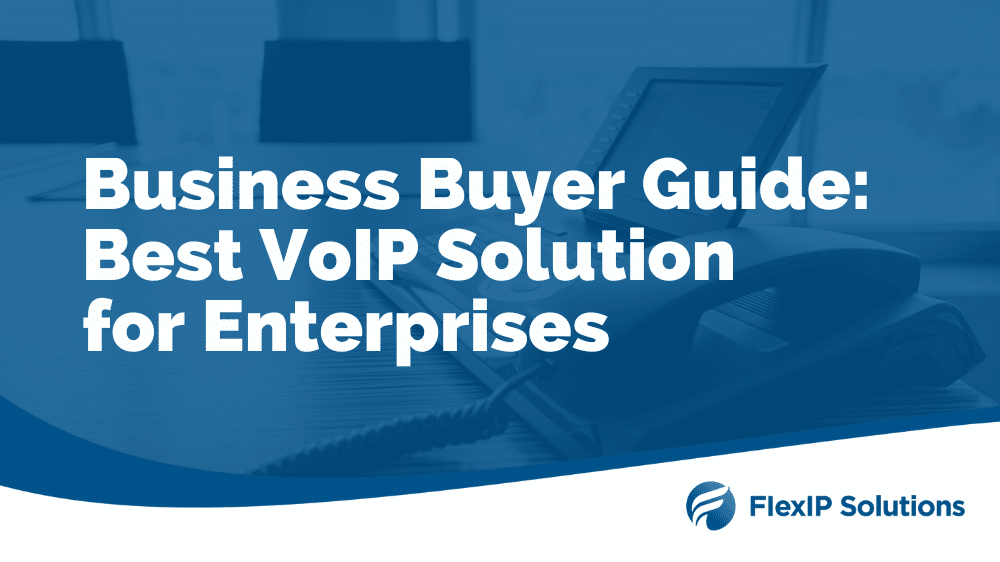Enterprises and large organizations need high-quality business phone services to facilitate effective internal team collaboration and external customer interactions.
For decades, traditional landlines, desk phones and on-premises PBXs were the go-to solutions for business communications, whether deployed at a single business location or dozens. Many enterprises have shifted to VoIP (Voice over Internet Protocol) systems to take advantage of their increased flexibility and scalability.
If your enterprise is considering upgrading its business phone system, you must know the ins and outs of enterprise VoIP solutions. In this blog, we’ll walk through everything you need to know about enterprise VoIP, including what it is, how it works, deployment models, key features and how to choose the right phone system for your business.
What is Enterprise VoIP?
Enterprise VoIP is a telephony technology that lets enterprises and large-scale businesses with hundreds or even thousands of employees in geographically distributed locations stay connected with colleagues and customers through phone calls and conference calls.
VoIP technology allows businesses to make and receive calls from any device that connects to the Internet, as long as there’s adequate network bandwidth in place.
Enterprise VoIP phone systems offer a better business experience than traditional on-premises PBX systems. VoIP comes with expected functionality like call routing and is more flexible and cost-efficient than legacy systems.
Enterprise VoIP solutions can also equip businesses with unified communications (UC) or UCaaS services, which allows them to communicate through channels like messaging, SMS texting and video conferencing.
Plus, enterprise VoIP systems quickly scale services up or down to add or remove any lines without the lengthy and costly process of traditional legacy telephony.
In contrast with regular VoIP solutions, enterprise VoIP supports high-volume calls, multi-line telephony, SIP trunking services, auto attendants, advanced call handling and even CCaaS services (contact center) functionality.
How Does Enterprise VoIP Work?
When your enterprise uses a VoIP system, analog voice calls are converted into data packets. The packets travel over the public Internet or any private Internet Protocol (IP) network. Using a VoIP service, your enterprise can call other telephony-enabled devices with an Internet connection, such as IP desk phones, conference phones, laptops, tablets or smartphones.
For a VoIP solution to work, users need a modem and Wi-Fi router that can provide high-speed Internet connectivity and a device that can connect to both the Internet and the user’s virtual phone service account.
Business VoIP Deployments
Enterprise VoIP can be installed through a communications service provider in an on-premises or hosted deployment.
On-Premises VoIP
Accessing on-premises VoIP requires an on-premises IP-PBX which resides physically on-site at a business location. The on-premises IP-PBX handles communications within an office, office building, or organization connected to the public telephone network.
Hosted VoIP
Hosted VoIP is an Internet-based telephony service managed by a hosted VoIP provider. Hosted VoIP replaces POTS (plain old telephone service) lines and analog, on-premises equipment and moves your enterprise telephone system to the cloud.
VoIP Features for Enterprises
Enterprise organizations should expect a number of key features from their enterprise-grade VoIP provider, including:
- 24/7 nationwide support via phone calls and text messages
- Custom data retention policies
- Unlimited calling in the United States
- Unified communications (built-in video meetings and instant messaging)
- Conference calls
- Customizable caller ID
- Multi-level auto-attendant
- Number porting support
- Visual voicemail
- Custom advanced call routing
- Integrations with other technology systems, including CRMs, marketing automation platforms, and project management systems such as Salesforce, HubSpot and more
- Number forwarding
- Real-time call transcriptions
- Call analytics and reporting
How do I Choose a Phone System for My Enterprise Business?
Now that you understand what an enterprise VoIP system is and how it works, you must know how to select the right one for your business. Here are the significant factors to consider when buying an enterprise phone system.
Buying Consideration 1: Budget & Cost-Savings
When switching to enterprise VoIP, expect initial startup costs, including:
- new phone systems
- modems and routers upgrades
- keeping business numbers and line extensions
However, when your enterprise weighs this against the costs of maintaining your existing on-premises equipment, you could reduce expenses and save money on your annual IT budget. Many companies value the ability to treat their communications as an operational expenditure instead of the long-term depreciation treatment of an on-site PBX as a capital expenditure.
VoIP also integrates with tools and services that increase your team’s productivity, including email services, social media, web browsers, IM/SMS/MMS services, CRMs, enterprise text messaging platforms and more. Your enterprise may find that your return on investment (ROI) is located in the hours of the time your team saves rather than the monthly bill itself.
Need help assessing your current telecommunications environment? FlexIP Solutions can help with our free telecom assessment – a $997 value plus any found savings – free! To get started or learn more about your free telecom assessment, visit the Flex Telecom Assessment page or call 888.905.6311.
Once you’ve chosen your VoIP service provider, select a VoIP service plan. Some VoIP service providers, like FlexIP Solutions, provide custom quotes tailored to the exact needs of every seat at each location, so you aren’t over-subscribed services and only paying for what you’re using.
Buying Consideration 2: Bandwidth
VoIP calls require a certain amount of bandwidth on your enterprise’s network. Bandwidth refers to the volume of data that can be processed on the network simultaneously. Enterprise businesses typically subscribe to a premium data plan with your ISP (Internet service provider). A good rule of thumb for VoIP calling is to have at least 100Kbps of upload and download bandwidth per line. However, just because your enterprise has 600 phones doesn’t necessarily mean you’ll be making 600 calls at once, so usage habits at each business location must be factored into your bandwidth needs.
Buying Consideration 3: Quality of Service
Any high-quality enterprise VoIP provider will ensure the deployment of a quality of service (QoS) router on the edge of your network. This router will help guarantee high-quality voice calls by prioritizing real-time network traffic from audio and video channels over non-real-time data like emailing and web browsing.
Why FlexIP Solutions is a Leading Enterprise VoIP Provider
FlexIP Solutions delivers managed communications services customized for businesses of all sizes and optimized for the best value and performance. The company was founded in 2009 on the principles of consultative solutions engineering; white-glove service implementation; ongoing monitoring, management and reporting; and on-demand customer service from real people.
Today, those best practices are the foundation of the FlexIP Perfect-Fit Promise.
Our Perfect-Fit Promise takes a holistic view of your company’s needs and objectives and delivers a white-glove, fully managed communications solution that:
- Lowers your costs by providing only what you need when you need it
- Offers the most advanced features and customization in the market
- Scales affordably and reliably
- Enables fast and efficient multilocation and remote workforce management
- Offloads setup, training – and ongoing training for new employees – to our team
- Provides you with a true, single point of contact for fast resolution of any issues. We even interface with your data provider, so you don’t have to.
Don’t take our word for it; you can see how we helped longtime customer Advanced Enviro Systems avert communications disasters three times – check out this success story here.
Enterprise Phone System Frequently Asked Questions (FAQs)
The experts at FlexIP Solutions have been solving communications challenges for businesses for decades. In that time, we’ve encountered some frequently asked questions (FAQs) about enterprise VoIP.
Is enterprise VoIP any different than standard VoIP ?
Enterprise VoIP systems typically are equipped with more advanced features than standard VoIP systems that are in place for residential offerings, including conference calling, auto-attendants and PBX offerings. However, just because a service provider offers an enterprise-grade VoIP system doesn’t mean it isn’t accessible and purchasable by small businesses. FlexIP Solutions serves businesses of all sizes.
What other types of communications services are suitable for enterprises?
Enterprises can deploy a suite of companion communications solutions with their enterprise VoIP system, including:
- IP Phones
- UCaaS
- Contact Center
- Business Texting Platform
- SIP Trunking
- Networking
- Fax
- Web Meeting
- Business Continuity & Telecom Recovery Services
- Remote Work Solutions
Ready to unify your communications? Let’s talk. Call or text FlexIP Solutions at 833.779.7700.


